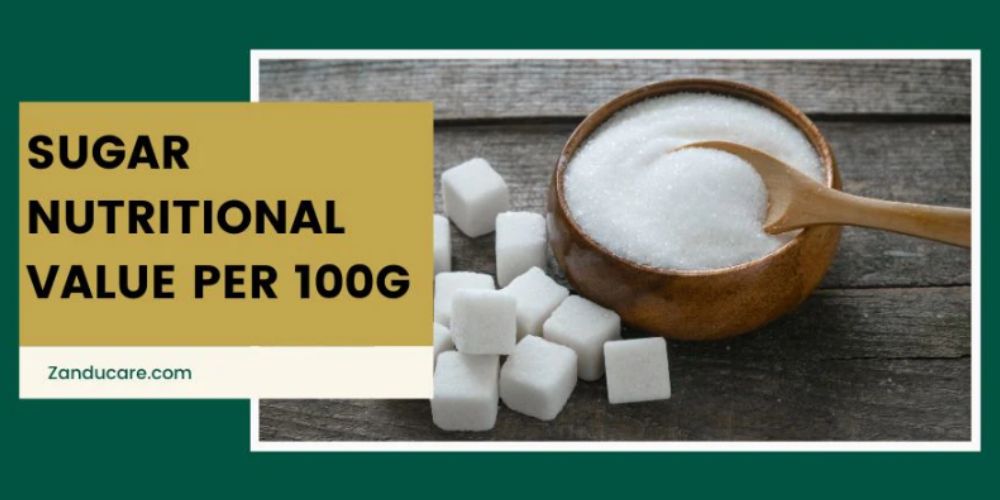
Sugar: Types, Effects, Calories, Nutrients Per 100g
Can you imagine your life without sugar? Be it the artificial sugar in your favourite sports drink or natural sugar from fruits, sugar is essential. Despite this widespread prevalence, little is known about the nutritional value of sugar.
No matter the type of diet you follow, it is no good without adding some sugar to the mix. Sugar is an excellent glucose source, fueling your body needs to keep you going. Even Ayurveda promotes using natural sugar to maintain proper balance between all doshas, making it a worthy addition to most meals.
But do you know the nutritional value of sugar per 100g? Understanding sugar's nutritional value is important for making informed diet choices. Hence, this blog will explore these nutritional values to help you make an informed choice.
|
Did You Know!
|
But what is sugar all about?

In simple terms, sugar is a carbohydrate that provides your body the energy needed to keep going. There are many different types of sugar with different chemical compositions, and some of the best-known of these types include:
- Glucose is the most important type of sugar as it is your body's primary energy source. Glucose is found naturally in fruits and vegetables, making it one of the healthiest forms of sugar. In fact, our bodies can make their glucose by breaking food molecules like fats, protein, and carbohydrates.
- Sucrose: This is another popular form of sugar we use daily for cooking and baking. This unique sugar falls under the disaccharide category, which means it is made of two simpler sugars: glucose and fructose.
- Fructose: Fructose is another popular simple sugar naturally found in honey and fruits. The human liver metabolises these sugars differently than glucose.
Furthermore, sugar is classified into two categories depending on its source. For instance, sugar in dairy, vegetables and fruits falls under natural sugar.
On the other hand, there is the type of table sugar we use daily that is sourced from processed foods. These sugars are added to your food during the preparation to enhance taste and flavour.
Nutritional value of sugar per 100g
Understanding the sugar's nutritional value per 100g is important for making informed choices about your diet. So, here is a detailed breakdown of sugar’s nutritional value per 100g:
|
Nutrient |
Quantity |
|
Calories |
385 calories |
|
Carbohydrates |
99.98g |
|
Fibre |
0g |
|
Sugars |
The mixture of fructose and glucose |
|
Proteins |
0g |
|
Fats |
0g |
|
Vitamins and Minerals |
Negligible amounts |
This table highlights that while sugar is delicious and most food items would not taste good without it, it does not provide many minerals, fibres, and vitamins. This brings us to the Glycemic Index (GI), a ranking system for measuring how quickly a food item can increase blood sugar levels. Hence, it is no news that sugar has a higher GI and can cause blood pressure to rise at a moment's notice.
Are there any notable health implications of taking sugar?

Consuming sugars in moderate quantities does not do much bad to your body. However, things can be entirely different with excessive sugar consumption in both the short term and the long term.
|
Short-Term Consequences |
Long-Term Consequences |
|
Consuming excessive sugar in the short term might contribute to energy fluctuations, sugar crashes, increased cravings for sweet food items, and mood swings. |
Long-term excessive sugar consumption can lead to type-2 diabetes, heart disease, obesity, dental issues and even certain cancers. |
Most importantly, remember that your sugar intake directly impacts your blood sugar levels. As you consume sugar, your body needs to release insulin to transport sugars into cells to convert them into energy.
Unsurprisingly, excessive intake can result in insulin resistance, where cells lose their responsiveness to insulin. This, in turn, hinders the body's ability to regulate blood sugar, paving the way for more adverse consequences.
What does Ayurveda say about sugar intake?
Ayurveda is well-known for its ability to classify food items based on their unique qualities. These categorisations include:
- Rasa: This defines the sugar's taste as sweet.
- Virya: Virya deals with the energy of food items and classifies sugar as heating.
- Vipaka: The final one is the vipaka, which deals with post-digestive effects and leaves for our
This is where the Ayurvedic concept of balance comes into the picture. This means you need to make efforts to take moderate quantities of sugar. Of course, Ayurveda does not always recommend direct sugar consumption, but you can replace traditional sugar with natural sweeteners such as honey, jaggery and palm. This is an important must-have since artificial sugar does not offer many nutrients.
Thanks to the advancements in Ayurveda over centuries, you can lower sugar cravings in numerous ways. Here are some of the most effective tips to reduce sugar cravings and intake:
- Use Spices: Using spices like cardamom and cinnamon is one of the best ways to lower sugar cravings.
- Eating a Balanced Diet: As apparent as it may sound, maintaining a healthy and balanced diet is imperative to lower sugar dependency.
- Stick To Natural: Sugar from natural sources such as sweet fruits can be very helpful in reducing your cravings for sugar.
Also, do check our related guides:
Comparison Table: Nutritional Value of Different Sugars per 100g
|
Type of Sugar |
Calories (kcal) |
Carbohydrates (g) |
Fibre (g) |
Sugars (g) |
Glycemic Index |
Vitamins and Minerals |
|
White Sugar |
387 |
99.98 |
0 |
99.91 |
65 |
Trace amounts |
|
Brown Sugar |
380 |
97.33 |
0 |
96.21 |
64 |
Calcium, Potassium |
|
Jaggery |
383 |
98.5 |
0.4 |
96.35 |
70 |
Iron, Calcium |
|
Honey |
304 |
82.4 |
0.2 |
82.12 |
58 |
Vitamins B2, B3, B5 |
|
Palm Sugar |
384 |
92 |
1 |
86 |
35 |
Potassium, Zinc |
Are there any practical tips to reduce sugar intake?

Given the adverse consequences of increased sugar intake, many people have devised ingenious solutions to reduce sugar intake. That said, here are some effective tips to help you reduce your sugar intake:
- Read Labels Thoroughly: Competitive marketing has compelled most food manufacturers to trick customers with the information on labels. This makes it very important to read the label thoroughly and ensure you do not miss any details. Look for the "added sugar" section to determine how much sugar has been added during preparation.
- Use Sugar Substitutes: When it comes to cooking and baking with sugar, there are numerous alternatives to conventional sugar. You can choose natural substitutes like honey or go for artificial substitutes available in the market.
- Lifestyle Changes: Another effective way to lower your sugar intake is lifestyle changes. You can start simply by avoiding sugary drinks and then proceed to plan your meals and increase your protein intake. This will help regulate your blood sugar levels and gradually reduce sugar intake.
Also, do check our 100% ayurvedic super greens supplement.
Conclusion
Sugar is integral to your diet, giving your body the much-needed energy to keep going. However, excessive sugar consumption can also have many adverse consequences for your body. Understanding sugar and its impact on the human body makes it very important.
The best way to go here is to consume sugar in moderate quantities. This will ensure your body gets the necessary nutrients and keeps you going. You must consider integrating Ayurvedic wisdom with modern nutritional science to incorporate sugar into your diet. This will help you get the best of sugar with minimal adverse consequences.
FAQs
1. What is the nutritional value of 100g of sugar?
The nutritional value of sugar per 100g is about 99.98g of carbohydrates, with little traces of minerals and vitamins.
2. How much sugar is safe to consume daily?
Adults can consume about 30g of sugar, while children should not take more than 24g.
3. Are natural sugars healthier than processed sugars?
Natural sugars are always a better and healthier alternative to processed sugar.
4. What are the benefits of reducing sugar intake?
Reducing your sugar intake can have many benefits, including proper weight, a healthy heart, lower chances of diabetes, and better dental protection.
5. How does sugar affect diabetes?
Sugar can increase your chances of developing type-2 diabetes and can worsen things drastically for people already living with diabetes.
6. Can Ayurveda help in managing sugar cravings?
Ayurveda has many effective tactics, such as replacing conventional sugar with natural alternatives to help people lower their sugar intake.
7. What are some Ayurvedic alternatives to white sugar?
Some Ayurvedic alternatives to white sugar include jaggery, palm sugar, and honey.
Reference:
- Our bodies can make their own glucose by breaking food molecules like fats, protein, and carbohydrates. (https://newsinhealth.nih.gov/)
- Understanding the sugar's nutritional value per 100g is important for making informed choices about your diet.(https://www.ncbi.nlm.nih.gov/)
- Sugar from natural sources such as sweet fruits can be very helpful in reducing your cravings for sugar. (https://www.researchgate.net/)
- Another effective way to lower your sugar intake is lifestyle changes.(https://www.ncbi.nlm.nih.gov/)







Leave a comment
This site is protected by hCaptcha and the hCaptcha Privacy Policy and Terms of Service apply.